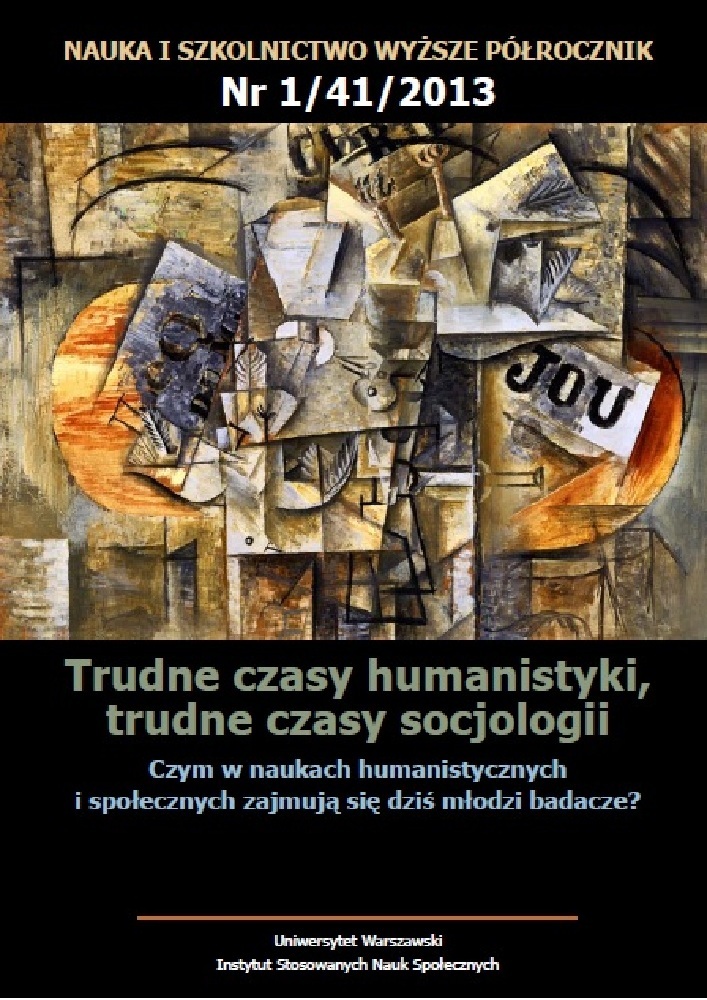Abstract
Today’s critique of ideology faces three influential concepts, that defined the understanding of ideological phenomenons in twentieth century. The first one of them was developed within the theory of totalitarianism. It perceived ideology as quasi-logical doctrine, justifying terror and absolute power. The second one was the end of ideology thesis. Ideology was conceived in it as a set of doctrines that mix up political and metaphysical issues. The last one was poststructuralist critique of the notion of ideology, as relying on naïve epistemological concepts. Author presents those three concepts, and tries to show their limitations from the point of view of contemporary ideology critique.References
Althusser L. 2006, Ideologie i aparaty ideologiczne państwa, przeł. A. Staroń, http://recyklingidei.pl/althusser-ideologie-aparaty-ideologiczne-panstwa (stan na 13.01.2014)
Arendt H. 2010, Kondycja ludzka, Warszawa: Aletheia
Arendt H. 2008, Korzenie totalitaryzmu, Warszawa: Wydawnictwa Akademickie i Profesjonalne
Arendt H. 2003, O rewolucji, Warszawa: Czytelnik
Arendt H. 2002, Sympozjon w Toronto. Dzieło Hannah Arendt, „Przegląd Polityczny” 55
Aron R. 2000, Opium intelektualistów, Warszawa: Muza
Barthes R. 2008, Mitologie, Warszawa: Aletheia
Bauman Z. 2007, Julian Hochfeld, w: Sułek A. (red.) Socjologia na Uniwersytecie Warszawskim, Warszawa: Wydawnictwo IFiS PAN
Beiner R. 1982, Hannah Arendt on Judging, w: H. Arendt, Lectures on Kant’s Political Philosophy,
Chicago: University of Chicago Press
Burke E. 1994, Rozważania o rewolucji we Francji, Kraków: Znak
Eagleton T. 1991, Ideology. An introduction, London: Verso
Foucault M. 1980, Truth and Power, w: Foucault M., Power/Knowledge. Selected Interviews
and Other Writings, New York: Pantheon
Jameson F. 2010, The Valences of the Dialectic, London: Verso
Jameson F. 1998, The Antinomies of Postmodernity, w: tegoż, The Cultural Turn. SelectedWritings on the Postmodern, London: Verso
Kant, I. 2005, Ugruntowanie metafizyki moralności, Kraków: Zielona Sowa
Kurelić Z. 1996, Dark Crystal, ”Političkamisao” 5
Larrain, J. 1979, The Concept of Ideology, London: Hutchinson
Leder A. 2011, Pozycja podmiotu i pole podmiotowe, czyli o urokach analizy pozoru,
„Przegląd Humanistyczny” 2
Lock G. iMaiolo F. 2010, La guerre totaleindustrielle. Kilka uwag o zarządzaniu jako globalnym fundamentalizmie, „Kronos” 3
Lukács, G. 1988, Historia i świadomość klasowa. Studia o marksistowskiej dialektyce, Warszawa: PWN
Malešević, S. 2002, Rehabilitating Ideology After Posststrucutralism, w: Malešević, S., MacKenzie (red.) Ideology After Poststructuralism, London: Pluto Press
Mills C.W. 1968, A Letter to the New Left, w: Ch. I. Waxman (red.) The End of Ideology Debate, New York: Funk &Wagnalls
Poster M. 1984, Foucault, Marxism and History, Cambridge University Press
Purvis, T., Hunt A. 1993, Ideology, Discourse, Ideology, Discourse, Ideology...,
”British Journal of Sociology” 3
Shills E. 1968, The End of Ideology?, w: Ch. I. Waxman (red.) The End of Ideology Debate, New York: Funk &Wagnalls
Świrek K. 2012, Retoryka końca ideologii, w: MarcjanikM. (red.), Retoryka mediów retoryka w mediach, Warszawa: Oficyna Wydawnicza ASPRA – JR
Žižek S. 2011, Did Somebody Say Totalitarianism?, London: Verso
Žižek S. 2008, O wierze, Warszawa: Aletheia
Žižek S. 2009, Widmo ideologii, przeł. M. Kropiwnicki, w: Kropiwnicki M., Kutyła J. (red.), Žižek. Przewodnik Krytyki Politycznej, Warszawa: Wydawnictwo Krytyki Politycznej
